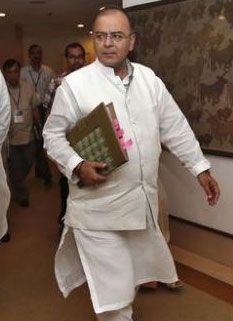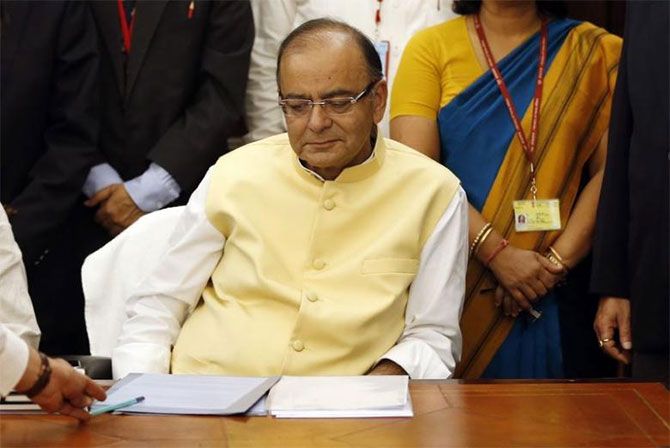 Going by the number of changes Mr Jaitley’s next Budget is likely to see, he will go down in the history of Budget-making as the finance minister who ushered in the largest number of changes in a single Budget, says A K Bhattacharya.
Going by the number of changes Mr Jaitley’s next Budget is likely to see, he will go down in the history of Budget-making as the finance minister who ushered in the largest number of changes in a single Budget, says A K Bhattacharya.

The annual Budget-making exercise from this year will be different in many ways. This is going to be unusual. Only a few finance ministers have had the chance of making fundamental changes in the way Union Budgets are presented.
Finance Minister Arun Jaitley will be one of them - and not just for bringing about a change or two, but most likely for as many as five fairly significant changes.
In 1999, Yashwant Sinha departed from the past practice of presenting the Budget at 5 pm. Mr Sinha chose to present the Budget for 1999-2000 on the morning of February 27 that year. Presenting the budget at 5 pm was a legacy of the British Raj, but it took more than half a century after Independence for a finance minister to change the time of Budget presentation.
A few years later, Jaswant Singh in February 2003 discarded the practice of presenting the Budget speech in two distinct parts - Part A and Part B. The all-important tax proposals would always be included in Part B of the speech, which would be revealed separately after the presentation of the Part A of the speech that contained the broad review of the economy and details of the government’s main expenditure programmes.
Mr Jaitley has already indicated that the impact of the goods and services tax (GST) on the annual Budget would be significant.
With 13 state Assemblies having already endorsed the passage of the Constitution Amendment Bill on GST and the target of securing the approval of half the Assemblies likely to be realised before the coming winter session of Parliament, it appears that the finance minister may well meet the coveted goal of rolling out the new indirect taxes regime from next April.
If that happens, then the Budget exercise will be less about indirect tax rates and more about expenditure allocations.
While presenting his Budget in February 1997, Palaniappan Chidambaram had introduced three-slab income-tax rates for individuals - 10 per cent on the lowest slab of income, 20 per cent for the second income slab and 30 per cent on the top income slab.
The system of three-slab income-tax rates for individuals has stood the test of time and no finance minister in the last 19 years found it necessary to change that structure.
Yes, surcharges may have been levied and the income slabs have been revised upwards for obvious reasons, but no finance minister after Mr Chidambaram had to really worry about what rates should be fixed for individual income tax.
The new system’s stability and simplicity have been an unqualified boon for the people and the economy, even though it had denied subsequent finance ministers the freedom to make any significant changes in the direct tax rates.
Mr Jaitley’s Budget for next year would achieve something similar for all the indirect tax rates, barring the Customs duties.
Note that the GST regime will subsume all other indirect tax rates like those for excise, services and central sales tax and this overall rate would be decided by the GST Council and the finance minister’s Budget would have limited scope to change them.
In addition, there are four different ways the Budget exercise is likely to be impacted from 2017-18 - the manner in which the government’s expenditure will be classified, the fiscal consolidation target that the finance minister will be required to chase, the inclusion of key expenditure provisions meant for the Indian Railways, in lieu of a separate railway Budget, and perhaps an advanced schedule for Budget presentation.
There is yet another possibility of a change, though that is unlikely. This may arise out of the recommendations of a committee that is exploring the feasibility of switching over to a new financial year cycle - other than the April-March system that has been followed for the last several decades.
Work on doing away with the distinction of the government’s expenditure under Plan and non-Plan heads has already made headway. With the abolition of the Planning Commission and discontinuation of the practice of preparing annual plans for central ministries as also for the states, it is only logical that the Budget ceases to classify government expenditure under Plan and non-Plan heads.
Considerable uncertainty, however, continues over how the fiscal deficit targets would be defined from the next year.
A committee, headed by former revenue secretary N K Singh, is entrusted with the task of providing a road map for the manner in which the government should define its fiscal consolidation targets. Whatever the committee and the government decide would bring about yet another change in Mr Jaitley’s Budget for 2017-18.
The inclusion of the erstwhile Railway Budget provisions in the general Budget would not pose a big challenge. What needs to be carefully watched is whether the finance minister resists the temptation of announcing Railway freight and fare proposals in the general Budget.
The real benefit from the abolition of railway Budgets would accrue only when the general Budget only outlines the railways’ expenditure proposals (duly vetted by the railways ministry through its internal exercises), allowing the fixation of freight and fares by the proposed rail tariff authority.
Advancing the presentation of the Budget by a month from end-February is an idea that is still being debated within the government. There are advantages of advancing the Budget presentation, but there are also formidable challenges.
It remains to be seen if Mr Jaitley manages to introduce this change also in his Budget for 2017-18. But there is no denying that going by the number of changes Mr Jaitley’s next Budget is likely to see, he will go down in the history of Budget-making as the finance minister who ushered in the largest number of changes in a single Budget.
Photograph: Punit Paranjpe/Reuters






